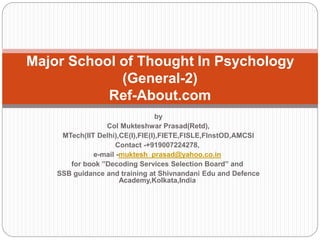
Major school of thought in psychology
- 1. by Col Mukteshwar Prasad(Retd), MTech(IIT Delhi),CE(I),FIE(I),FIETE,FISLE,FInstOD,AMCSI Contact -+919007224278, e-mail -muktesh_prasad@yahoo.co.in for book ”Decoding Services Selection Board” and SSB guidance and training at Shivnandani Edu and Defence Academy,Kolkata,India Major School of Thought In Psychology (General-2) Ref-About.com
- 2. Major School of Thoughts in Psychology When psychology first emerged as a science separate from biology and philosophy, the debate over how to describe and explain the human mind and behavior began. The different schools of psychology represent the major theories within psychology. The first school of thought, structuralism, was advocated by the founder of the first psychology lab, Wilhelm Wundt. Almost immediately, other theories began to emerge and vie for dominance in psychology. In the past, psychologists often identified themselves exclusively with one single school of thought. Today, most psychologists have an eclectic outlook on psychology. They often draw on ideas and theories from different schools rather than holding to any singular perspective. The following are some of the major schools of thought that have influenced our knowledge and understanding of
- 3. Structuralism and Functionalism Structuralism is widely regarded as the first school of thought in psychology. This outlook focused on breaking down mental processes into the most basic components. Major thinkers associated with structuralism include Wilhelm Wundt and Edward Titchener. The focus of structuralism was on reducing mental processes down into their most basic elements. The structuralists used techniques such as introspection to analyze the inner processes of the human mind. Functionalism formed as a reaction to the theories of the structuralist school of thought and was heavily influenced by the work of William James. Unlike some of the other well-known schools of thought in psychology, functionalism is not associated with a single dominant theorist. Author David Hothersall notes, however, that some historians even question whether functionalism should be considered a formal school of psychology at all given its lack of a central leader or formalized set of ideas. Instead of focusing on the mental processes themselves, functionalist thinkers were instead interested in the role that these processes play.
- 4. Gestalt Psychology Gestalt psychology is a school of psychology based upon the idea that we experience things as unified wholes. This approach to psychology began in Germany and Austria during the late 19th century in response to the molecular approach of structuralism. Instead of breaking down thoughts and behavior to their smallest elements, the gestalt psychologists believed that you must look at the whole of experience. According to the Gestalt thinkers, the whole is greater than the sum of its parts.
- 5. Behaviorism Behaviorism became a dominant school of thought during the 1950s. It was based upon the work of thinkers such as: John B. Watson Ivan Pavlov B. F. Skinner Behaviorism suggests that all behavior can be explained by environmental causes rather than by internal forces. Behaviorism is focused on observable behavior. Theories of learning including classical conditioning and operant conditioning were the focus of a great deal of research. The behavioral school of psychology had a significant influence on the course of psychology, and many of the ideas and techniques that emerged from this school of thought are still widely used today. Behviour techniques still frequently used in psychotherapy and behavior modification programs are Behavioral training, token economies, aversion therapy and other techniques
- 6. Psychoanalysis Psychoanalysis is a school of psychology founded by Sigmund Freud. This school of thought emphasized the influence of the unconscious mind on behavior. Freud believed that the human mind was composed of three elements: the id, the ego, and the superego. The id consists of primal urges while the ego is the component of personality charged with dealing with reality. The superego is the part of personality that holds all of the ideals and values we internalize from our parents and culture. Freud believed that the interaction of these three elements was what led to all of the complex human behaviors. Freud's school of thought was enormously influential, but also generated considerable debate. This controversy existed not only in his time, but also in modern discussions of Freud's theories. Other major psychoanalytic thinkers include: Anna Freud Carl Jung Erik Erikson.
- 7. Humanistic Psychology Humanistic psychology developed as a response to psychoanalysis and behaviorism. Humanistic psychology instead focused on individual free will, personal growth and the concept of self-actualization. While early schools of thought were primarily centered on abnormal human behavior, humanistic psychology differed considerably in its emphasis on helping people achieve and fulfill their potential. Major humanist thinkers include: Abraham Maslow Carl Rogers. Humanistic psychology remains quite popular today and has had a significant influence on other areas of psychology including positive psychology. This particular branch of psychology is centered on helping people living happier, more fulfilling lives.
- 8. Cognitive Psychology Cognitive psychology is the school of psychology that studies mental processes including how people think, perceive, remember and learn. As part of the larger field of cognitive science, this branch of psychology is related to other disciplines including neuroscience, philosophy, and linguistics. Cognitive psychology began to emerge during the 1950s, partly as a response to behaviorism. Critics of behaviorism noted that it failed to account for how internal processes impacted behavior. This period is sometimes referred to as the "cognitive revolution" as a wealth of research on topics such as information processing, language, memory, and perception began to emerge. One of the most influential theories of this school of thought was the stages of cognitive development theory proposed by Jean Piaget.
